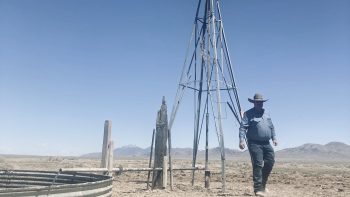Mini-cattle help buck hefty costs
TEXT OF STORY
Bill Radke: And back in the states now. Your average American beef cow is big. Hefty. That’s part of the idea — cattle producers want the maximum beef for their buck. But an increasing number of ranchers and breeders are deciding big is not so beautiful. They’re turning to more diminutive breeds, and saying smaller can be better. Reporter Megan Verlee visited a mini-cattle auction in Denver and has the story.
Megan Verlee: The mini-cattle here at the National Western Stock Show are perfect scale models of the mountains of meat in neighboring pens. The tallest is only chest-high. An Australian breeding experiment created the mini-Angus breed about a dozen years ago.
Rancher Neal Effertz was the first to try them in the U.S.:
Neal Effertz: Most people thought I was crazy.
Now, Effertz is one of roughly 600 breeders nationwide. He can tick off the reasons Bessie’s smaller siblings are a good investment: They eat less than regular cattle, they produce proportionally more beef, and they’re an easy sell to health-conscious consumers. Mini-cattle are often grass-fed and waistline friendly.
Effertz: We do see a lot of growth, and especially now because of escalating costs and people trying to manage their ranches more efficiently, there’s a real increased interest in these lowline cattle.
All that, Effertz says, is fueling a boom in mini-cows.
Auctioneer: All right, ladies and gentlemen, the auction is underway. And starting along at . . . I’ll let everybody bid. I’m at $2,000, bidding at $2,500.
Some of the cattle parading through the auction hall fetch more than their full-sized counterparts would. Twelve-thousand dollars for a breeding heifer impresses Lowell Genslinger, who raises standard Angus. But he’s not impressed enough to buy.
Verlee: Were you at all tempted?
Lowell Genslinger: No, no, no — not a bit.
Genslinger doesn’t quite call mini-cows a fad, but it’s clear he thinks they’re no threat to conventional cattle.
Mini-Angus owner Joe Nauer admits he needs a thick skin to shake off the teasing he gets from a friend with regular cattle.
Joe Nauer: He says, “How’s the midget cow farmers doing today?” So he kind of teases us a little bit, but I don’t mind. It’s all in fun, you know. We just turn around and say, “Yeah, and we make more money off of ours than you do.”
Like other miniature cattle fans at the stock show, Nauer is betting on the breeds’ popularity increasing. He hopes to use earnings from his herd to someday pay for his kids’ college tuition.
In Denver, I’m Megan Verlee for Marketplace.
There’s a lot happening in the world. Through it all, Marketplace is here for you.
You rely on Marketplace to break down the world’s events and tell you how it affects you in a fact-based, approachable way. We rely on your financial support to keep making that possible.
Your donation today powers the independent journalism that you rely on. For just $5/month, you can help sustain Marketplace so we can keep reporting on the things that matter to you.


















